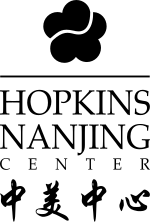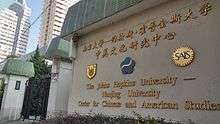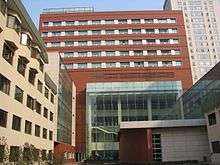Hopkins–Nanjing Center
The Johns Hopkins University – Nanjing University Center for Chinese and American Studies (Chinese: 南京大学—约翰斯·霍普金斯大学中美文化研究中心; pinyin: Nánjīng Dàxué Yuēhànsī Huòpǔjīnsī Dàxué Zhōngměi Wénhuà Yánjiū Zhōngxīn) or the Hopkins–Nanjing Center (Chinese: 中美中心; pinyin: Zhōngměi Zhōngxīn) for short, is an international campus of the Paul H. Nitze School of Advanced International Studies and a joint educational venture between Johns Hopkins University and Nanjing University that opened in Nanjing, China in 1986. Former Hopkins President Steven Muller and former NJU President Kuang Yaming worked together to create the Center, recognizing the importance of improved understanding and relations between their respective countries. Muller believed China to be "the country of the future." [1]
南京大学—约翰斯·霍普金斯大学中美文化研究中心 | |
 | |
| Type | Private |
|---|---|
| Established | 1986 |
Academic affiliation | Johns Hopkins University Nanjing University |
| Director | Adam K. Webb Chen Yunsong |
| Postgraduates | 175 |
| Location | Nanjing, China |
| Website | https://hnchome.nju.edu.cn/ http://sais-jhu.edu/hnc |
History
In 1984, Steven Muller, then the president of The Johns Hopkins University, conceived of the Center as a legacy of his presidency, and as an opportunity for JHU to be the first American university to establish a formal presence in China. Nanjing University was chosen as a partner because of its prestige, as one of the best universities in China, because of its location, and because of its willingness to devote resources to the Center. The Center opened in 1986, and has operated continuously since, even during tumultuous periods like the 1989 Tiananmen Square Protests and the 2003 SARS crisis.[2] In the latter case, the program was shifted to a temporary location in Hawaii for the duration of the outbreak.[3]
Today, the Center is known in the United States as a preeminent institution for the training of Americans with China-focused careers.
Mission
The mission of the Hopkins–Nanjing Center is "to develop and train professionals to provide leadership in managing successful bilateral and multilateral relationships involving China and the West in an increasingly complex international environment."[4]
Academics

The Center is unique in that it is the only joint program of its kind in China. The Hopkins–Nanjing Center offers an opportunity for students to appreciate how Western and Chinese societies view themselves and how they interact with other cultures. Students benefit from modern facilities, such as the only uncensored, open-stacks library in China, offering both English and Chinese collections.
The Center's international students take most of their courses in Chinese taught by Chinese faculty, while Chinese students are taught by American or international faculty, with classes primarily in English. Students may also take some courses taught in their native language, so most classes have a mix of Chinese and international students.
The academic program has evolved over time. The Center originally provided English language courses for Chinese students and Chinese language courses for international students. The English language courses were suspended during the 1997-1998 school year, as the Chinese administrators of the Center concluded that the language skills of entering Chinese students were already sufficient for the program. This decision was opposed by the American faculty. The Chinese language courses were suspended several years later. These changes reflected a controversy over whether the Center represented a substantive graduate program or a language school; for many years, Johns Hopkins SAIS only awarded half-credit for participation in the program on these grounds.[2]
Students
The student body at the center is composed of approximately 50% Chinese citizens and 50% international students. The international population is made up largely of Americans but includes individuals from countries such as France, Russia, South Korea, Canada, and the UK. Many students hold undergraduate degrees in Chinese or East Asian Studies. Some also hold advanced degrees prior to attending the Hopkins–Nanjing Center.
During the 2009-2010 school year, there were 40 international Certificate students, 11 Second-Year MA students, and 19 First-Year MA students, reflecting the Center's intent to expand the Masters program. The Chinese student body has a higher ratio of Certificate students, but an overall relatively equal number of students.
Programs of study

The Center offers two distinct academic programs: a two-year Master of Arts in International Studies and a one-year graduate Certificate program.
Certificate program
The Hopkins–Nanjing Center offers a graduate Certificate in Chinese and American Studies. Certificate students spend one year at the Center and have great flexibility in the courses they choose to take during that year. The Center’s international (American and all other non-Chinese) students learn about China from a Chinese perspective. These students focus on how the Chinese interpret China-United States relations, how they view their changing economic and political systems, and how they analyze their own political, social, and intellectual history.
Master of Arts in international studies
The Hopkins–Nanjing Center Master of Arts in International Studies is a two-year graduate degree jointly offered by The Johns Hopkins University School of Advanced International Studies (SAIS) and Nanjing University. Students will benefit from the resources offered by both institutions and are considered alumni of both schools. The M.A. allows students to select from one of four concentrations: Chinese Studies, International Politics, International Economics, and Comparative and International Law. The M.A. degree will bring Chinese and international students together in the same classrooms — a feature of the Hopkins–Nanjing Center not found in other programs offered in China. The first student graduated from the MA program in January 2008.[5]
SAIS Five-Semester Option
Students who have been admitted to the School of Advanced International Studies in Washington, D.C. as well as the Hopkins–Nanjing Center are eligible to participate in a five-semester option which would ultimately award them both a Certificate in Chinese and American Studies from the Hopkins–Nanjing Center and a Master of Arts degree from SAIS. After the successful completion of two semesters in Nanjing and three additional semesters at SAIS in Washington, they will receive both credentials. The order of the coursework is flexible, but the year at the Hopkins–Nanjing Center must be completed during any contiguous academic year. For instance, a student may:
- Attend the Hopkins–Nanjing Center before or while applying to SAIS, where they will spend three additional semesters
- Spend a year at the Center after completing two semesters in SAIS, then return to SAIS for one semester
- Begin the Hopkins–Nanjing Center certificate program in the fall after completing three semesters at SAIS in Washington
Students pursuing this option are required to meet the admissions requirements of both the HNC Certificate program and the SAIS M.A. degree. Separate applications are required for each program. Acceptance to either the Hopkins–Nanjing Center or to SAIS does not constitute acceptance to the other institution.
HNC Five-Semester Option
Alumni who have already completed the one year certificate program are eligible to return to the Center and graduate with a Master of Arts from both Johns Hopkins and Nanjing University in three additional semesters. Admission to the class is not guaranteed and alumni applicants will follow the same procedures as first time applicants.
See also
References
- Rienzi, Greg. "An Unlikely Success Story in China", Johns Hopkins Gazette, June 11, 2007. Vol 36, No. 37.
- Auger, Vincent A.; L. Marvin Overby (1997–1998). "Teaching and Learning in Nanjing: Community, Communities, and Politics in an Overseas Program". Polish Political Science. Polish Political Science Association. XXVII-XXVIII: 65–83. ISSN 0208-7375.
- "Media Advisory-Hopkins-Nanjing Center Fall Semester Shifted to U.S. Location". Johns Hopkins University School of Advanced International Studies. May 19, 2003. Archived from the original on June 2, 2010. Retrieved 2009-06-29.
- Hopkins Hopkins Nanjing Center | The Center and China
- "Centerpiece Spring 2008" (PDF). Johns Hopkins University-Nanjing University Center for Chinese and American Studies. Retrieved 2009-06-29.
Further reading
- Wheeler, Norton. Role of American NGOs in China's Modernization: Invited Influence (Routledge, 2014) online review, covers the history of the Nanjing Center
